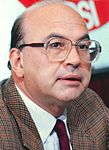Italian general election, 1992
|
|
|||||||||||||||||||||||||||||||||||||||||||||||||
|---|---|---|---|---|---|---|---|---|---|---|---|---|---|---|---|---|---|---|---|---|---|---|---|---|---|---|---|---|---|---|---|---|---|---|---|---|---|---|---|---|---|---|---|---|---|---|---|---|---|
|
|||||||||||||||||||||||||||||||||||||||||||||||||
|
All 630 seats in the Italian Chamber of Deputies and 315 (of the 325) seats in the Italian Senate |
|||||||||||||||||||||||||||||||||||||||||||||||||
| Turnout | 87.3% | ||||||||||||||||||||||||||||||||||||||||||||||||
|
|||||||||||||||||||||||||||||||||||||||||||||||||

Legislative election results map. Light Blue denotes provinces with a Christian Democratic plurality, Red denotes those with a Democratic Socialist plurality, Green denotes those with a Lega Nord plurality, Gray and Brown denotes those with a Regionalist plurality.
|
|||||||||||||||||||||||||||||||||||||||||||||||||
|
|||||||||||||||||||||||||||||||||||||||||||||||||
Giulio Andreotti
Christian Democracy
General elections were held in Italy on April 5, 1992 for the 11th Parliament of the Republic. They were the first without the traditionally second most important political force in Italian politics, the Italian Communist Party (PCI), which had been disbanded in 1991. It was replaced by a more social-democratic oriented force, the Democratic Party of the Left (PDS), and by a minority entity formed by members who did not want to renounce the communist tradition, the Communist Refoundation Party (PRC). However, put together they gained around 4% less than what the already declining PCI had obtained in the 1987 Italian general election, despite PRC had absorbed the disbanded Proletarian Democracy (DP).
The other major feature was the sudden rise of the federalist Lega Nord, which increased its vote from 0.5% of the preceding elections to more than 8%, increasing from a single member both in the Chamber and the Senate to 55 and 25, respectively. The onda lunga ("long wave") of Bettino Craxi's now centrist-oriented Italian Socialist Party, which in the past elections had been forecast next to overcome PCI, seemed to stop. Christian Democracy and the other traditional government parties, with the exception of the Republicans and the Liberals, also experienced a slight decrease in their vote.
...
Wikipedia



